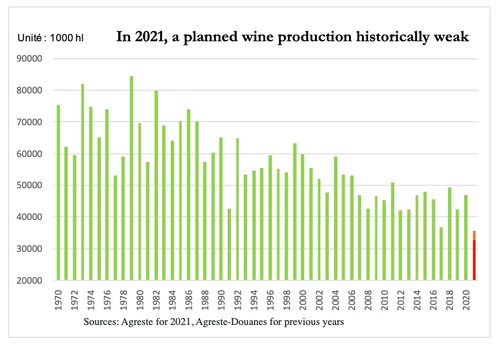As noted in our four word intro to April 11's "France declares ‘calamité agricole’ after record cold":
This is very bad....
From ZeroHedge:
Oenophiles will be heartbroken to learn that the world's second-largest wine-producing country is expected to slash production by as much as 30% this year due to spring frosts and summer downpours caused disease in grapes.
"Wine production in 2021 is forecast to be historically weak, below levels in 1991 and 2017 that were also affected by severe frost in spring," the French farm ministry said in a report.
"Yields are expected to be close to those of 1977, a year when the harvest was cut by damaging frost and summer rainfall."
The 2021 wine outlook produced by the ministry said output would be between 32.6 million and 35.6 million hectolitres, 24-30% less than last year.
For some context, a hectolitre is around 100 liters or about 133 wine bottles.
Agriculture Minister Julien Denormandie described the weather anomalies that impact crops this year as the "greatest agricultural catastrophe of the beginning of the 21st century."...
....MORE
Une production viticole 2021 estimée, au 1er août, entre 32,6 et 35,6 millions d’hectolitres
Because of the uneven nature of the frosts, cold air settled lower, some areas lost 75 - 90% of their grapes. See April 25's "Insurance/Ethanol: "Champagne “lucky” with frost compared to other French wine regions" plus Insurance Coverage of the Vineyards"
See also May, 2019's "One of the Scariest Sentences In the English Language: Crop Progress Report Edition":
The weekly crop progress report was released yesterday but first a quick diversion:
In the spring of 1315, unusually heavy rain began in much of Europe.The story continues:
Throughout the spring and summer, it continued to rain and the temperature remained cool. These conditions caused widespread crop failures. The straw and hay for the animals could not be cured and there was no fodder for the livestock. The price of food began to rise. Food prices in England doubled between spring and midsummer. Salt, the only way to cure and preserve meat, was difficult to obtain because it could not be evaporated in the wet weather; it went from 30 shillings to 40 shillings.
Cold and wet is very bad.
